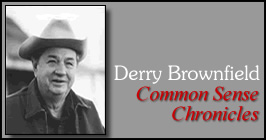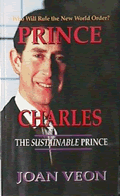Other
Brownfield
Articles:
Fear Not-The
Odds Are on
Your Side
Derry Brownfield
March 2, 2008
NewsWithViews.com
Last March I discussed with my listeners that President Bush was in Brazil and the motive of his visit was to form some sort of a partnership with that country concerning the �biofuels� industry. Apparently we now have a US/Brazilian Biofuels Pact referred to as the Bush LULA Pact. The President of Brazil is Luiz Inacio Lula da Silva (for the rest of this article I will refer to him as Lula). I�ve not been able to get a copy of the PACT that was signed, if one does exist, however, on March 9, 2007 Secretary of State Condoleezza Rice and Brazil Foreign Minister Celso Amorim, signed a memorandum pledging closer cooperation on researching production of energy from alternative sources. The accord also promotes alternative fuels in the region and develops industry-wide standards and codes that could lay the groundwork for a global biofuels market.
Bush and Lula said they were committed to reaching a successful result in a new round of World Trade Organization negotiations. Thomas Shannon, Assistant Secretary of State for Western Hemisphere Affairs said, �The world knowing that the United States and Brazil are prepared to work together carries a lot of weight in the Americas.� (Bush has made eight trips to Latin America since he became president.)
Brother Jeb Bush became involved in Brazil prior to leaving his Florida governor�s office. While discussing the ethanol industry about a joint partnership with Brazil, he co-founded the Inter-American Ethanol Commission to promote regional production. Note that Jeb co-founded the Commission. The other co-chairs include Roberto Rodrigues, President of the Superior Council of Agribusiness of Brazil and Luis Alberto Moreno, President of the Inter-American Development Bank.
Agribusiness refers to the Multinational Agricultural corporations. Cevasa Ethanol Distillery in Sao Paulo, Brazil is the largest producer of sugarcane in Brazil. Cargill recently purchased 63 percent of its shares, giving Cargill majority control of the corporation. While Bush was in Brazil thousands of members of an international social movement made up of rural workers held massive, non-violent occupations of multinational agribusiness corporations throughout Brazil. Nine hundred women occupied the Cevasa (Cargill) ethanol distillery. Organizers of these protests claimed the actions were to protest the model of economic growth via industrialized agriculture for export. That while Brazil�s agro-export boom may boost Brazil�s Gross Domestic Product, at the same time it is creating poverty for the rural poor due to land concentration, environmental destruction, and unemployment and labor exploitation.
For every 100 hectares (247 acres) planted to sugarcane for ethanol production, only one job is generated, while on a family farm of this size 35 jobs are generated. In Brazil, agribusiness is controlled by a handful of multinational corporations that are usurping more and more Brazilian territory and expelling more rural poor to the already swollen urban centers. The organizers stated that the large scale, industrialized production for export to the Global North (meaning the US) is entirely controlled by multinational agribusiness corporations. Bishop Tomas Balduino said, �The pact between Brazil and the United States for the promotion of ethanol is sinister. It�s just going to promote death, marginalization, poverty and the destruction of the environment because it defends the interests of large multinationals.�
According to Joao Pedro Stedile, �The Lula government is stepping up its land occupations, including the seizure of lands that could be used for ethanol production. The Lula government is supporting the mode of agricultural production known as agribusiness that allies the landowners with the transnational corporations.�
The social movement supporters want Brazilian ethanol production in the hands of small farmers as part of a diversified agricultural system in which local food production for Brazilians is prioritized, assuring land, livelihoods and jobs for the rural poor. Brazil should focus on producing ethanol for its large internal market, not to sustain US consumption. The accord indicates that Lula is cooperating with Bush and agribusiness in order to ensure the industry remains controlled by large capital interests, while the Brazilian rural poor sink deeper into poverty. Bishop Balduino stated, �Today there is no more agrarian reform, there is agribusiness. Make no mistake; this accord will only benefit the multinationals and the elite.�
|
Subscribe to the NewsWithViews Daily News Alerts! |
We live in a global world that lives by the Golden Rule. Agribusiness has the gold, so Agribusiness makes the rules, not only in the United States and Brazil but around the world. The Multinational Corporations have a choke hold on all natural resources. The more hi-tech farming has become, the greater the need for capital and the Multinationals have the capital. These institutions with unlimited capital have convinced their governments that high-priced machinery along with complex equipment is better for a nation than having more people working. These entrenched forces, for their own power and profit, intend to keep agriculture under their control.
� 2008 Derry Brownfield - All Rights Reserved
Sign
Up For Free E-Mail Alerts
Derry Brownfield was born in 1932 and grew up during the depression. He is a farmer and a broadcaster. Derry attended the College of Agriculture at the University of Missouri where he received his B.S. and M.S. degrees. He taught Vocational Agriculture several years before going to work as a Marketing Specialist with the Missouri Department of Agriculture. Derry served as Director of the Kansas City Livestock Market Foundation at the Kansas City Stockyard prior to establishing himself in farm broadcasting.
Derry started farming when he was 16 years old and received the Future Farmers of America State Farmer degree in 1949. Since that time the Brownfield Farm has grown to over 1000 acres maintaining a herd of 200 registered Charolias cows.
In 1972, Derry and his partner established the Brownfield Network which now serves 250 radio stations throughout the Midwest with news and market information. In 1994, Derry started his own syndicated radio talk show and he is one of the most popular radio talk show hosts in America. The Derry Brownfield Show can be heard on approximately 80 radio stations in 23 states. With his entertaining sense of humor and witty commentary he has captured audiences for over 30 years. His ability to present an informative talk show while being light and colorful is why he has a large loyal listening audience.
Derry Brownfield is a practical farmer, a practical business man and a very entertaining speaker. He travels extensively throughout the country speaking about his common-sense point of view.
Web Site: www.derrybrownfield.com
E-Mail: derrybrownfield@learfield.com
Brother Jeb Bush became involved in Brazil prior to leaving his Florida governor�s office. While discussing the ethanol industry about a joint partnership with Brazil, he co-founded the Inter-American Ethanol Commission to promote regional production.









